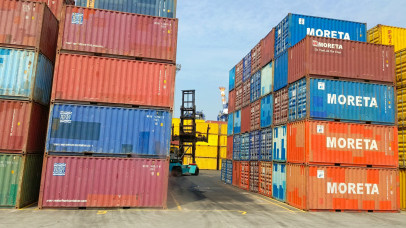Textiles on the move: “We’re going to design ourselves out of this shit”
‘Textiles on the move’ is the title of the conference on the future of the textile industry, education and design in the Netherlands, held in Spinnerij Oosterveld in Enschede on November 22 2019. The reason for this is the 100th anniversary of the Fashion & Textile Technologies course at Hogeschool Saxion. In the morning we had a variety of speakers: Anka Mulder, chairman of the board of Saxion, local politician Jeroen Diepemaat, D’66 member of parliament Jan Paternotte, interior designer Hella Jongerius, Aksel Parmaksiz of PVH (Tommy Hilfiger & Calvin Klein), Vigga Svensson, sustainable entrepreneur from Denmark, Jan Mahy, lector Smart and Functional Textiles and Sacha Tournier, program director Fashion & Textile Technologies. In the afternoon, the audience could choose from 3 out of 6 workshops presenting the research and education topics of ‘Saxion Textile’. They were led by alumni of the Saxion, next to designers, national and international researchers, and of course teachers and researchers associated with Saxion and the research group.
The conference was attended by some 130 people from a diverse background: academics, alumni, business partners, industry representatives, students, creative professionals etc.
Isrid van Geuns, chairwoman of the day started off by introducing the partners of the congress: Stichting de Maere, NL NextFashion and Textiles (Powered by ClickNL) and Enschede Municipality.
Anka Mulder Chairperson of the Executive Board of Saxion then highlighted the history of 100 years of textile education and the presently growing need for the knowledge of sustainable materials and circular production in the future.
Revival of the textile industry is possible, when we keep the UNESCO SDG’s in mind and focus on circularity.
Jan Patternotte put these remarks in an international perspective. At European level textile industry is still innovative and large, the Netherlands is a relatively small player but can, together with other innovative regions (Flanders, Hauts de France, NRW, etc.) play a pioneering role in the field of sustainable and circular textiles. Saxion UAS plays a crucial role between European universities and knowledge institutes and the European Textile Industry, which has a strong lobby in Brussels with Euratex. As the initiator and driving force behind a European network of “fashion & textile” universities of applied sciences, Saxion can link the industry’s needs to the (application-oriented) knowledge and innovative strength of the industry. In the Netherlands it is of great importance that the Dutch Circular Textile Valley has been formed and research by universities of applied sciences can contribute to solving social challenges. At this level of education also professional doctorates should be made possible, he finally argued.
Jeroen Diepemaat of the Municipality of Enschede spoke about the impact of textile education and research on the region and Enschede in particular. He referred to the Regio Deal where governments, UTwente, ROC and Saxion will work together in research into the recycling of textiles. He stressed the importance of supporting for Saxcell, also on a national level.
Hella Jongerius was then interviewed and she put textiles and knitting and weaving into perspective as a cultural phenomenon. Textile is relevant and the challenges are big; it’s a culturally funded material, making textiles is part of our genes. She showed the relevance of design by answering the questions about design methodology with examples from her own work and linking these to the state of the fashion and textiles industry. “We’re going to design ourselves out of this shit” was a statement to surely remember.
Aksel Parmaksiz, VP of Global Innovation Management at PVH (Tommy Hilfiger & Calvin Klein) very openly spoke about the value of the sustainable development goals (SDGs) for PVH, the way a large retail company like PVH adapts to the new, more sustainable requirements of this world and the PVH policies. Sustainability is clearly a part of the PVH strategy, but the company can only go slowly, step by step.
Vigga Svensson, sustainable entrepreneur from Denmark, addressed the same problem of ideals, strategies and the harsh reality of doing business. The fact alone that it took her and her company a year to rethink, remodel and remarket her business, impressed the audience. Now a truely circular business model is in place.
Jan Mahy and Sacha Tournier then commented on the future of higher vocational education about fair fashion and the textile industry.
In the afternoon the 130 people attending the event were shown around the Epy Drost building with its many textile development and testing facilities and chose out of the workshops called Young Saxion Entrepreneurs, Smart Solutions, Sustainable Designers, Circular Textiles and the Future of Textiles, all led by highly professional and involved people with a Saxion background.
Watch the aftermovie >>
Het laatste nieuws

What’s Up – Rens Tap per 1 januari 2025 met pensioen & Innovatief recyclingproces hotellinnen door SaXcell en Blycolin
Het voor u verzamelde bedrijfs- en economische nieuws uit de sector - 24 december

Trade Policy & Customs Update nr. 3, 2024
Trump elected: new tariffs might have an effect on your supply chain - December 19th, 2024

Modint Highlights 2024
Ieder jaar zetten wij de belangrijkste resultaten en activiteiten in een overzicht. Zo kun je heel eenvoudig zien wat Modint doet om jou als lid te ondersteunen. 2024 stond in het teken van innovatie,...
